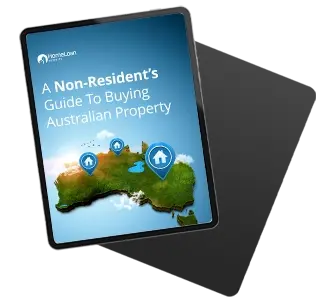What Is The Foreign Investment Review Board (FIRB)?
FIRB is an Australian government department that assesses applications from foreigners who would like to invest or buy a home in Australia.
Please see the section which applies to your situation to find out whether you need FIRB approval.
Who Needs FIRB Approval?
Temporary Residents
If you’re on a temporary visa such as a spouse visa, 457 work visa, a Temporary Skill Shortage (TSS) visa or student visa:
- You need approval from the FIRB.
- You can only buy one established dwelling, and it must be to live in; however you will be required to sell it once you do not live there anymore.
- You can buy an investment property; however, it must be a new property or vacant land to build a new property.
- You don’t need FIRB approval if you’re buying the property with an Australian citizen as joint tenants and you’re in a spousal relationship. This means it doesn’t apply to other relationships like business partners, mother/father and child, siblings, friends or relatives.
Foreign Investors
If you’re a foreign investor:
- You need approval from the FIRB.
- The investment property must be a new property or vacant land to build a new property.
- You can’t buy an established dwelling as an investment property.
- They can buy a new property in their name and rent it out to their child that is on a temporary visa.
Exceptions For Foreign Citizens
However, you are exempt if:
- The property developer has obtained an exemption certificate for the new property that you are buying.
- You were awarded the property by a court order.
- You were awarded the property in a divorce settlement.
Please refer to the government department website for the full details of who is and is not eligible.
Buying A Home in Australia As A Non-Resident
Everything you need to know as a non-resident buying a property in Australia.

Can I buy a house in Australia as a foreigner ?
It is possible, and we’ll tell you how in our brand new Home Buyers Program. Sign up to access great loan tips from our experts.
SIGN UP FOR FREEWho Doesn’t Need FIRB Approval?
Australian Citizens
If you’re an Australian expat living overseas or Australian Citizen living in Australia:
- You don’t need approval from the FIRB.
- You can buy a new property, existing property or vacant land.
- You can live in the property, or it can be an investment.
Australian Permanent Resident
If you’re a foreign national who has a permanent residency visa:
- You don’t need approval from the FIRB.
- You can buy a new property, existing property or vacant land.
- You can live in the property, or it can be an investment.
New Zealand Citizen
If you’re a New Zealand citizen:
- You don’t need approval from the FIRB.
- You can buy a new property, existing property or vacant land.
- You can live in the property, or it can be an investment.
- You are not required to be in the country at the time of contract exchange or settlement; however, you may incur a foreigner stamp duty surcharge if you are not in the country at the time of contract exchange. Requirements vary, so it’s best to speak to your relevant state revenue authority for up-to-date information.
Temporary Resident Buying With An Australian Citizen Spouse
If you’re on a temporary visa such as a spouse visa, 457 work visa, or student visa and are buying the property with your Australian citizen spouse*:
- You don’t need FIRB approval if you are buying the property as joint tenants and you’re in a spousal relationship. This means it doesn’t apply to other relationships like business partners, mother/father and child, siblings, friends or relatives.
- You’ll need FIRB approval if you are buying the property together as tenants in common.
- You can buy a new property, existing property or vacant land.
- You can live in the property, or it can be an investment.
*Includes de facto partner (both same-sex and different-sex).
Foreigner Buying A Home With An Australian Citizen
- You’re buying a home together as joint tenants and in a spousal relationship.
- This exemption doesn’t apply to investment properties.
- You must be in a spousal or de facto relationship, i.e. can’t be two family members or relatives.
- You must not be purchasing as tenants in common (learn more about the difference between these two types of property ownership).
Foreigner Buying A Home With An Australian Permanent Resident
- You’re buying a home together as joint tenants and in a spousal relationship.
- This exemption doesn’t apply to investment properties.
- You must be in a spousal or de facto relationship.
- You must not be purchasing as tenants in common.

Make Informed Decisions With The 360° Home Loan Assessor
- Determine how much you can contribute as a deposit
- Get clarity on the total costs of buying a home
- Explore interest-rate options based on your situation
Does Buying As An Investment Or Owner-occupied Make A Difference?
Will it make a difference if you live in the property or not? As a general rule, investment properties are accepted more readily.
If you’re on a temporary visa or work visa then you can:
- Usually buy a new property or an established property.
- Will usually be required to sell your home when you leave Australia.
- If you obtain citizenship or permanent residency, then you won’t have to sell your property.
If you’re a foreign citizen living overseas then you:
- Are unlikely to be allowed to buy a property to live in Australia. This is because you don’t have a valid visa which allows you to stay in Australia.
- If you’ve been granted a temporary residency visa, then you may be able to buy a home before you move.
If you’re an Australian living overseas, you can:
- Buy a property to live in Australia as long as you can prove to your lender that you’ll be able to afford the debt.
- Either you’ll need to prove that you’ll continue your job in Australia or that you have another income source.
Does FIRB Charge Application Fees?
Up until mid-2015, application fees were not required. However, now FIRB charges an application fee to all foreign investors who want to buy land or property in Australia.
The only exception to this is if you’re an Australian citizen, a Permanent Resident or an NZ citizen.
Fees can vary depending on the value and type of the residential property or land that you want to purchase:
| Value of the residential property or land that you want to purchase | Fee payable for new or near-new property or vacant land | Fee payable for established property |
|---|---|---|
| Less than $75,000 | $4,300 | $12,900 |
| Between $75,000 – $1,000,000 | $14,700 | $44,100 |
| Between $1,000,001 – $2,000,000 | $29,500 | $88,500 |
| Between $2,000,001 – $3,000,000 | $59,000 | $177,000 |
| Between $3,000,001 – $4,000,000 | $118,000 | $265,500 |
| Between $4,000,001 – $5,000,000 | $112,800 | $354,000 |
| Above $5 million | Refer here for more information | Refer here for more information |
Typically, residential land will cost less than the fees for buying a business, commercial property or farmland.
How Do I Lodge A FIRB Application?
You can lodge your application on the Australian Tax Office’s Residential Real Estate Application Form.
You’ll need to provide your contact details, full legal name, address of the property and pay the required FIRB approval fee.
Have your passport and Australian visa (if applicable) handy as you’ll need to enter those details.
If you don’t know the title details of your property, then you can leave these blank. For new properties, they often do not have title details until a few weeks before they are complete.
Types Of Properties You Can Buy
- Investment properties: In most cases, the Australian government will approve applications to buy an investment property on the condition that it is a new property. You can often keep an investment property if you leave Australia.
- Home (owner-occupied): If you’re buying a home, then you may be able to buy an established property (one that wasn’t recently built). You’ll have to sell your property when your visa expires, and you leave Australia.
- Vacant land (investment): In most cases, the Australian government will approve applications to buy vacant land on the condition that you commence construction of a dwelling on the land within 24 months. You can often keep a property that you build as an investment property if you leave Australia.
Applying For Permanent Residency/Citizenship
It isn’t known to us if owning real estate in Australia in any way affects your application for citizenship.
Please speak to a migration agent for more information.
At What Stage Do I Need To Contact FIRB For Approval?
You can’t apply for FIRB “pre-approval” so you should refer to the FIRB guidelines before you begin looking for an Australian property. You can only apply for FIRB approval when you have chosen a specific property to buy.
As long as you’re following the FIRB‘s rules, then it is highly likely that your investment will be approved. Once you find a property, then you can sign the contract of sale with the condition that allows you to back out of the purchase if FIRB approval is not granted.
However, you can get pre-approval for the mortgage itself before you find a property. To find out more refer to our applying for a loan section.
Difference Between Joint Tenants And Tenants In Common
With few exceptions to requiring approval from FIRB, the devil is in the detail when it comes to buying as a joint tenant versus tenants in common.
What’s the difference between the two?
Joint Tenants
This is by the most common way for partners to buy property, and it’s where you and your partner own equal portions in the property (50/50).
The main benefit has to do with estate planning in that in the event either you or partner dies, the survivor will automatically receive the other parties’ portion.
Tenants In Common
This is where you specify the portion that you will own in the property and, therefore, this dictates your contributions to the mortgage and dividends from any sale.
This is most common when buying with a friend, business partner or even a relative, rather than a spouse because it offers a level of asset protection.
Rather than the other property owner receiving your portion upon your death, you have the option to nominate someone else.
Why Does The Government Monitor Foreign Investment?
The government monitors foreign investment to ensure that the investment will benefit Australia. In particular, foreign investors are limited to investing in “new” properties so that their investment adds to the existing housing stock in Australia. This is to prevent speculation, which has little benefit for the Australian economy, and that could result in escalating housing prices.
Did you know that the government approves the vast majority of FIRB approval applications? If you meet the guidelines provided on their website, then there are very few reasons that could cause your application to be declined.
Will I Be Hit With The Foreigner Stamp Duty Surcharge?
Most Australian states (other than Tasmania and Northern Territory) have introduced a foreign stamp duty surcharge as well as a hike on land tax (for some locations).
Generally speaking, the surcharge applies to foreigners or temporary Australian residents, but there are exceptions to these rules.
It’s best you refer to the foreign citizen stamp duty page for specific information around this extra tax.
Do You Need Help With A Mortgage?
We are mortgage brokers that specialise in financing the purchase of Australian real estate by foreigners, Australians living abroad or people temporarily residing in Australia.
Please call us on 1300 889 743 or (+61 2 9194 1700 if you are overseas) or fill in our free assessment form and we can contact you via email or phone to discuss your finance options.
